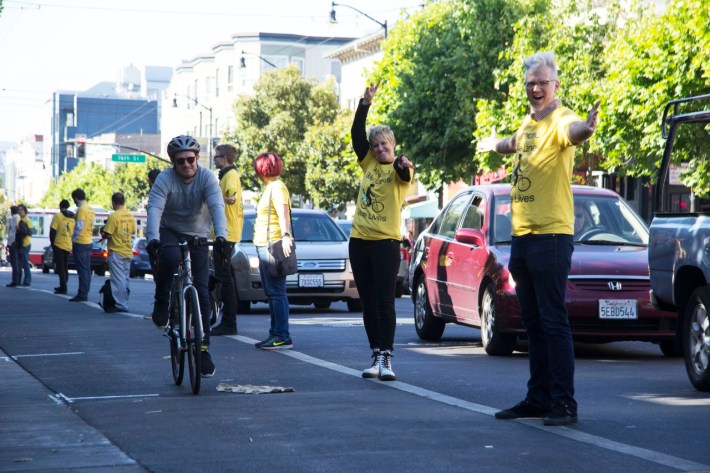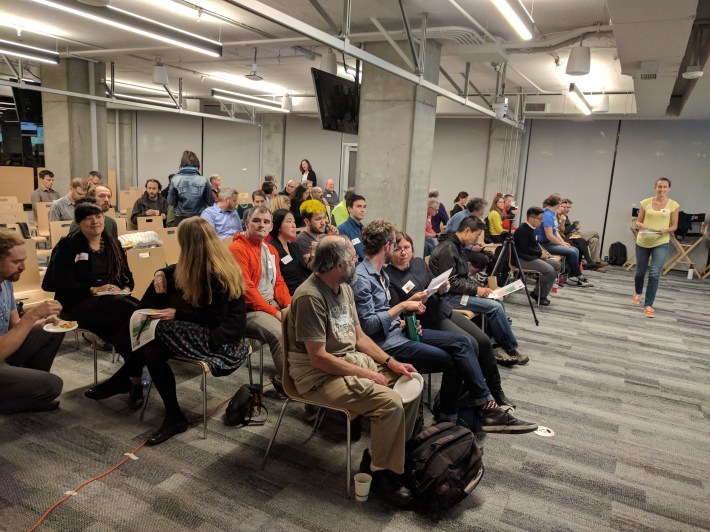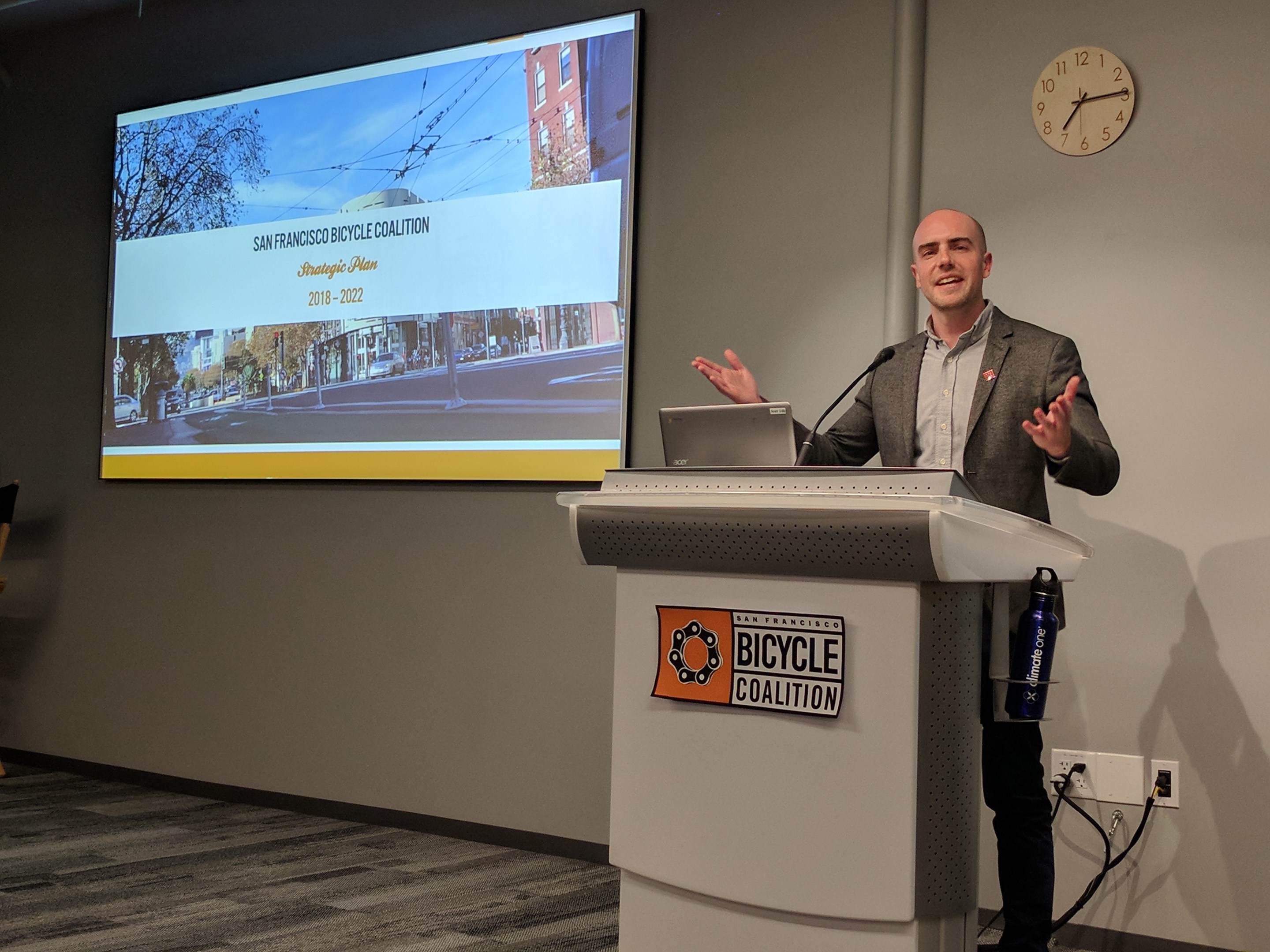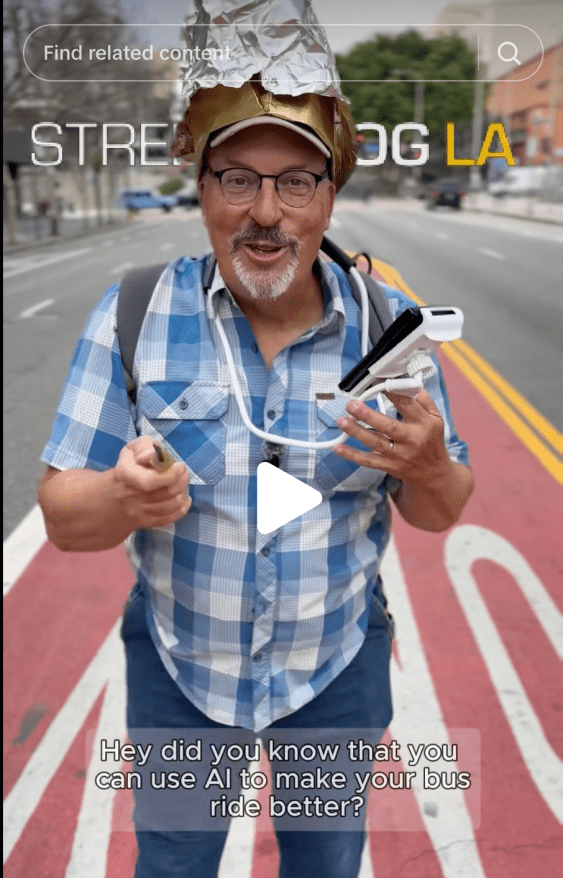Physically protected bike lanes are coming to Valencia Street. "We are pretty sure some segments can be designed and implemented as soon as this Fall," said Janice Li, advocacy director for the San Francisco Bicycle Coalition, to 120 people who attended its annual member meeting Wednesday evening at the Google Community Space on the Embarcadero. She added that the first stakeholder meetings for the Valencia bike-lane improvements "will be coming in March or April ... we’re really going to need to build a lot of support."
Protected bike lanes on Valencia, long sought by bicycle advocates fed up with the proliferation of ride-share cars blocking the existing bike lanes, came in response to a question from the audience after the SFBC's formal presentation about its goals and strategic plan from 2018 to 2022. The question highlighted a major goal of SFBC executive director Brian Wiedenmeier in how the organization conducts its advocacy. "We need you, the members, to speak up where you see problems--then we organize and come together."

He said the SFBC has largely focused on adding protected bike lanes in areas that have little or no current bike infrastructure, such as with the push for a protected bike lane on Turk in the Tenderloin. Valencia already has a bike lane, albeit one that is all-but unusable. But multiple people-protected bike lane demonstrations, as seen above, got attention from media and local politicians. Other SFBC members gathered data on how often the lanes were blocked.

"People organized with people-protected bike lanes, to make a strong and visible case for the need for protected infrastructure on Valencia," he said. "It got people’s attention. The SFBC was able to meet with supervisors, find funding, and I’m happy to say planning has started."
But that also highlighted a weakness of the SFBC--and one which Wiedenmeier and the other staff are working hard to remedy. The group wants to broaden membership and advocacy beyond geographical areas and social, economic, and ethnic groups that already have a strong and active bicycle community. In other words, they want the diversity of the cycling community to match the diversity of San Francisco.
"We want to support bicycling for everyday transportation," said Ana Vasudeo, SFBC program director. She talked about the importance of reaching out to communities such as Bayview-Hunters Point, and other communities of color, and determining what stops people from riding bikes. For example, "In Chinatown, we don't start out talking about biking--we talk with them about how they get to school." She explained that the SFBC determined that they don’t bike because they have dangerous streets, so they walk with families and talk with them about their safety concerns and what they need fixed. "Then we run bike rodeos for children in flat playgrounds. We do a learn-to-ride for the parents and for the children," to get them more confident and safe riding a bike.
Wiedenmeier tied all of these efforts into the core values and goals of the SFBC. The first objective for 2018 to 2022: establish physically-protected bike lanes as the standard for bike improvements, especially on Vision Zero high-injury corridors.
Specifically, they want, as part of the next plan:
- 30 miles of protected bike lanes across every supervisorial district
- 25% of approved bike lane projects include protected bike infrastructure
- 18 miles annually of new and upgraded bicycle and pedestrian safety infrastructure constructed on high-injury corridors
The full list of the goals is available on the SFBC website. At the meeting, they also talked about the recent progress on long-fought-for-goals, such as getting protected bike lanes approved on Turk and Upper Market.
After the formal presentation and a Q&A, 14 candidates for the SFBC board were each given two minutes to speak. Voting started yesterday and a breakdown of the slate of candidates is available here.
Speaking of elections, Wiedenmeier stressed that they will be quizzing all of the mayoral and supervisor candidates about their commitment to cycling--and then the SFBC will decide on political endorsements. "We will be asking tough questions of all of our candidates ... I expect this to be a huge chunk of our work in the Spring ahead and then again for the election in November."
Meanwhile, one of the overriding goals of the SFBC, and another of its core values, is to never lose sight of the joy of riding a bike. "We want to introduce all of San Francisco to the joy of bicycling. This is where we convince people who aren’t sure about biking in the city that they can do it," said Vasudeo.
"We celebrate bicycling as a fun, healthy way to get around and connect with each other and our communities," said Wiedenmeier. "One of the most important reasons I ride is it brings me joy."






